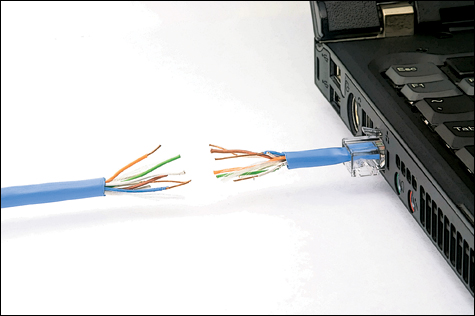Getting online in Maine can be painfully slow. And the planned Verizon-FairPoint merger won’t help.
By JEFF INGLIS | August 22, 2007
 |
Verizon unloads
For seven years, Verizon has been busy getting itself out of the landline business around the country, and around the world. Here are the highlights:
2000 Verizon sells 133,000 landlines in WISCONSIN to a couple of local telephone companies for $365 million.
SEPTEMBER 2002 Verizon sells its shares in NEW ZEALAND Telecom, a landline company in that country.
SEPTEMBER 2002 Verizon sells 675,000 telephone lines in MISSOURI,KENTUCKY, AND ALABAMA for $2.6 billion to CenturyTel, a publicly traded company based in Louisiana.
APRIL 2004 Verizon announces it will sell Verizon Dominica (serving the DOMINICAN REPUBLIC), and its shares of phone companies in PUERTO RICO AND VENEZUELA, to a couple of Mexico-based telephone companies for $3.7 billion. The deal affects 15 million landline, broadband, and wireless customers.
OCTOBER 2004 Verizon announces the company is looking to sell 15 million of its nearly 50 million landlines AROUND THE NATION, to focus on wireless service and high-speed Internet connectivity.
MAY 2005 Verizon sells 700,000 lines in HAWAII for $1.65 billion to private-equity firm the Carlyle Group (a company backed financially by both former president George H.W. Bush and members of Osama Bin Laden’s family).
MAY 2006 Verizon’s hopes to sell 3.4 million landlines and related operations in ILLINOIS, INDIANA, MICHIGAN, AND OHIO are reported in the Wall Street Journal Online, and is seeking to earn between $5 billion and $6 billion from that deal. In addition, its hopes to sell its northern New England lines for between $2 billion and $3 billion.
JANUARY 2007 Verizon announces that it will sell its NORTHERN NEW ENGLAND operations, including 1.6 million landlines, for $2.7 billion to FairPoint Communications.
_JI |
Most of the objections about the Verizon-FairPoint telephone-company merger proposal do not hinge on whether either of them is providing any kind of worthwhile, valuable, or useful telephone service.The proposal, in which industry giant Verizon would sell the wired-telephone parts of its business in northern New England (including the wires, switching equipment, maintenance staff, and everything else) to industry midget FairPoint Communications, is relevant in Maine — and New Hampshire and Vermont — mainly in terms of what it would mean for rural customers who want high-speed, broadband Internet access.
Everyone involved — the two companies, the merger’s opponents, and state officials — talks about the deal’s impact on bringing DSL broadband Internet service to rural Mainers. This is indeed a concern in many remote parts of Maine, although state figures show that, overall, 85 percent of Mainers already have the option to choose broadband service via cable-Internet or wireless access, if not DSL.
While the states’ public utilities commissions technically regulate only telephone service, and not Internet access, DSL enters the discussion because it can be provided over regular old copper telephone wires, so long as those lines are properly maintained and equipped.
 Topics
Topics:
News Features
, U.S. Government, Company Activities and Information, Mergers and Acquisitions, More  , U.S. Government, Company Activities and Information, Mergers and Acquisitions, Maine Public Utilities Commission, Internet Connectivity, Broadband Internet, DSL, Communications Products, Peter Reilly, Richard Davies, Less
, U.S. Government, Company Activities and Information, Mergers and Acquisitions, Maine Public Utilities Commission, Internet Connectivity, Broadband Internet, DSL, Communications Products, Peter Reilly, Richard Davies, Less 